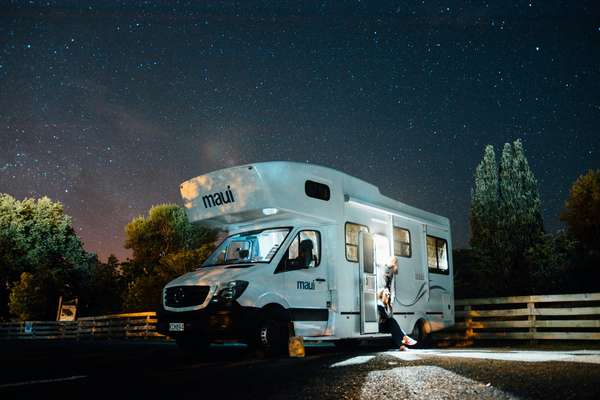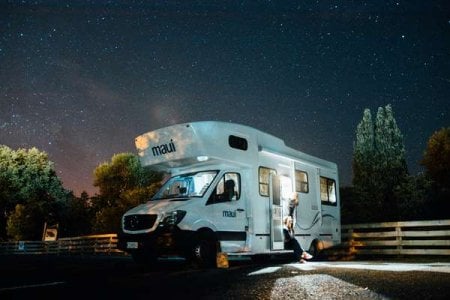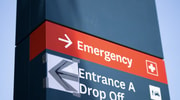

With more Australians than ever exploring the country by caravan, one travelling mechanic has a clear warning: check three vital things before heading into remote areas.
Chris Morgan, originally from Toogoolawah in Queensland, has been on the road with his family and tools since early 2025.
He’s helped countless caravanners stranded in some of the most isolated parts of Australia and plans to be in Perth for Christmas. His advice is straightforward: 'It's always wheel bearings, lights, or suspension work that is needing to be done.'
Wheel bearings: a small part that can cause a big breakdown
Wheel bearings connect your tyres to the axles and let them rotate smoothly. Driving on rough or unsealed roads, hitting potholes, or overloading your caravan puts extra strain on them. This can cause them to loosen or wear out faster.
The problem is you often won't know there’s an issue until it’s too late. Bearings 'crash and burn when they’re neglected,' with grease losing its lubricating and cooling ability, friction building, and metal surfaces wearing until they fail completely. At that point, you’re likely stranded and facing a costly fix.
'If you can pick the drawbar up with one hand, this is a recipe for disaster'
The signs of trouble can be subtle. At your first stop, walk around each wheel and feel the hubs carefully. If one is noticeably hotter than the others, have it checked immediately. Bearings should be inspected and regreased every 12 months or 10,000km, or every 6 months or 5,000km for off-road or heavy use.
Neglecting them can lead to heat build-up, seizure, and wheel assembly failure, which could cause a blowout at high speeds. Emergency repairs can cost $500 to $1,500, plus callout fees and accommodation while you wait for parts in remote areas.
Service cost comparison
Preventive bearing service: $100-200 per axle
Emergency breakdown repair: $500-1,500 per axle
Remote callout: $200-500 extra
Accommodation while waiting: $100-200 per night
Lights: a safety essential, not just a legal requirement
Lights are crucial for visibility on long stretches of remote roads and for signalling distress if you break down. 'There's normally a wiring issue with lights that needs to be fixed,' Chris says.
A common culprit is the trailer plug. Check that the metal pins haven’t closed together from repeated use. A new plug costs about $10, and it’s worth carrying a spare.
Modern LED caravan lights are reliable, but if they fail you often need to replace the whole unit. Professional electrical repairs usually cost $100-150 per hour, with most light issues taking 1-3 hours to fix.
Suspension: keeping your caravan stable
Suspension, together with correct load management, keeps the caravan and towing vehicle level and under control. Without this, swaying can quickly turn dangerous.
In one recent case, a truck driver had to swerve onto the shoulder to avoid a caravan that lost control and spun in the road ahead.
Did you know?
In Australia, 64% of the 14,000 recorded caravan accidents were linked to swaying. Common triggers include high winds, uneven surfaces, overtaking, and overloading.
Look for signs like excessive bouncing, uneven tyre wear, or clunking noises. Always stay within your caravan’s weight limit, as overloading can damage suspension and is illegal.
Australia’s caravan boom and what it means for safety
In 2024, Australians took 15.2 million caravan and camping trips, spending $14 billion. This remains well above pre-COVID levels, with almost one in every eight domestic overnight trips involving a caravan or campsite.
More vans on the road also means more first-time owners, many of whom don’t realise how quickly mechanical issues can escalate without regular checks.
The real cost of prevention vs emergency repairs
Annual caravan servicing typically costs $250-$600, depending on size and complexity. A tandem with independent off-road suspension and every accessory option might cost around $600 to service, but emergency repairs can easily exceed $2,000 once callout and accommodation costs are added.
Chris Morgan’s pre-trip checklist
- Book a professional service every 10,000km or annually
- Check wheel hub temperature after driving
- Test all lights and inspect trailer plug connections
- Assess suspension for unusual bounce or sway
- Weigh your caravan to ensure even, legal load distribution
Between services, keep an eye on the coupling, safety chain, jockey wheel, handbrake, tyre wear, tyre pressure, and any signs of bearing wear.
'Definitely make sure what you can have done, have done,' Chris says. 'Things happen, things break, but you can do what you can, which is the preventive maintenance before you go.'
Read more: ‘Don’t wait’: Big change coming for caravan owners—here’s what you need to know
Travelling mechanic urges caravan owners to check 3 things before hitting road | Yahoo News
https://au.news.yahoo.com/travellin...k-3-things-before-hitting-road-064127571.html
Caravan and camping data | Tourism Research Australia
https://www.tra.gov.au/en/domestic/caravan-and-camping-data
How to maintain your caravan or camper trailer wheel bearings | RV Daily
https://rvdaily.com.au/how-to-maintain-the-wheel-bearings-on-your-caravan-or-camper-trailer/
What's been your experience with caravan maintenance on the road? Have you encountered any of these three common issues during your travels? Share your stories and tips in the comments below!







